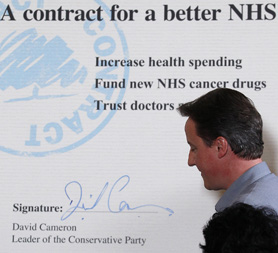Call for Cameron to introduce vouchers
An influential centre-right think tank tells Channel 4 News that David Cameron’s reforms of public services should include vouchers for people to spend at hospitals and schools.

Commenting on the Prime Minister’s plans to allow private companies to run public services, Andrew Haldenby, director of Reform, said: “The potential is truly revolutionary.”
Mr Haldenby said the logical outcome of what Mr Cameron was proposing was private firms tendering for contracts to run public services, such as schools and hospitals, with the public able to shop around.
“To me, the logic of what David Cameron is saying is for my family I choose health care which covers all of us. I could choose the NHS or Bupa. Will there be more private provision? Yes. Will there be more employees setting themselves up in new companies? Yes.”
In a report published last week, Reform described the Coalition Government’s reform of the public services as “all over the place” and lacking in radicalism.
A White Paper will be published in the next fortnight, with private firms and charities offered payment-by-results contracts to improve public services.
“The potential is truly revolutionary” Andrew Haldenby, Director, Reform
Mr Haldenby said instead of funding a set number of hospitals and doctors, the Government could reward organisations that succeeded in combating heart disease and cancer. In the criminal justice area, rewards could mirror re-offending rates.
“It’s about targeting the symptoms, not the cause; catching people early. It would lead to a world with fewer hospitals and prisons and different kinds of police officers doing different things.”
But Mr Haldenby said there was a gap between Mr Cameron’s vision and the policies the Government was pursuing. “There’s a disconnect between true radicalism and the reality of the policy.”
Extracts from Reform's report on public services
"Viewed as a whole, the Government's public service reform policies are all over the place."
"The Government is making police services accountable in the right way, to their local electorates."
"Most departments are lagging behind. Despite much rhetoric to the contrary, neither Health nor Education have dismantled central regulation and made services accountable to their users."
"Before the Government made the NHS the preferred provider in 2009, reforms sought to encourage diversity of provision and competition ... private providers continued to face significant barriers to entry and delivered only a small proportion of NHS funded care."
"Crucially, the 1997-2010 Governments decided to forbid parents choosing a private sector education with taxpayers' funds, even though it allowed it in the NHS, prisons and other areas of policy."
Union criticism
The Trades Union Congress had criticised the Prime Minister’s plans, but it was wrong to see what he was doing as a “vendetta” against the unions. Union leaders had “dutifully taken to the barricades” because they did not like what they were hearing.
“But what David Cameron is saying is not that he is going to prejudice the running of public services against the public sector. He is saying there should be fair competition and may the best man win. If they can do it better than the private sector, then they will.”
Police
Reform’s report praised the Home Office for making policing more accountable through elected commissioners, and Mr Haldenby said this was an area where progress would be seen to have been made by the next election.
Schools
On education, improvements would be harder to measure because for most parents a newly-established free school would be the most tangible example of change, and by 2014-15, there would not be many of these.
Vouchers would allow people to “take the money the Government spends on our behalf and you spend it where you like”, but this was being resisted by the Government.
A continuation of the Blair reforms
Private sector involvement in the running of public services is not new. Tony Blair's governments carried out several reforms in this area, among them independent sector treatment centres (ISTCs) and academy schools.
ISTCs are privately owned and offer NHS patients free care. They carry out common non-emergency surgery, such as hip replacements, and diagnostic tests at NHS hospitals.
Academies are state-funded, privately-sponsored schools. When they first started, their sponsors were expected to provide £2m, but they no longer have to do so. The schools are free of local authority control and set their own pay and conditions for staff.
Until the 2010 Academies Act, they were usually in deprived area, but the Coalition Government is allowing all schools to apply for academy status.
Under Tony Blair, councils were encouraged to outsource their services, but most remain in-house.